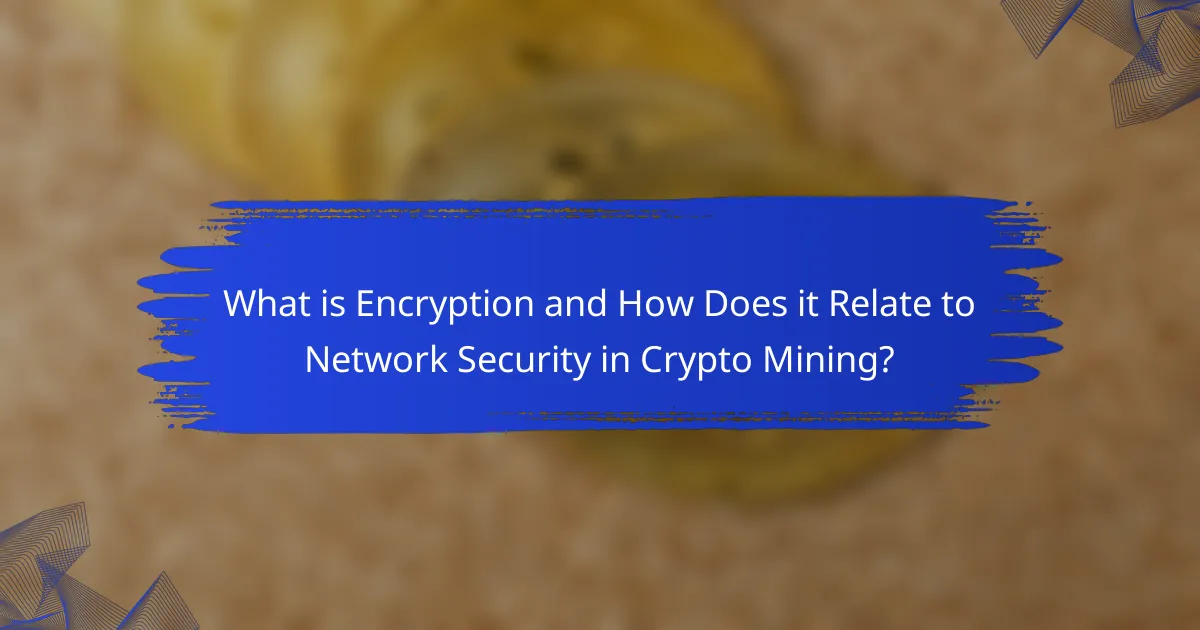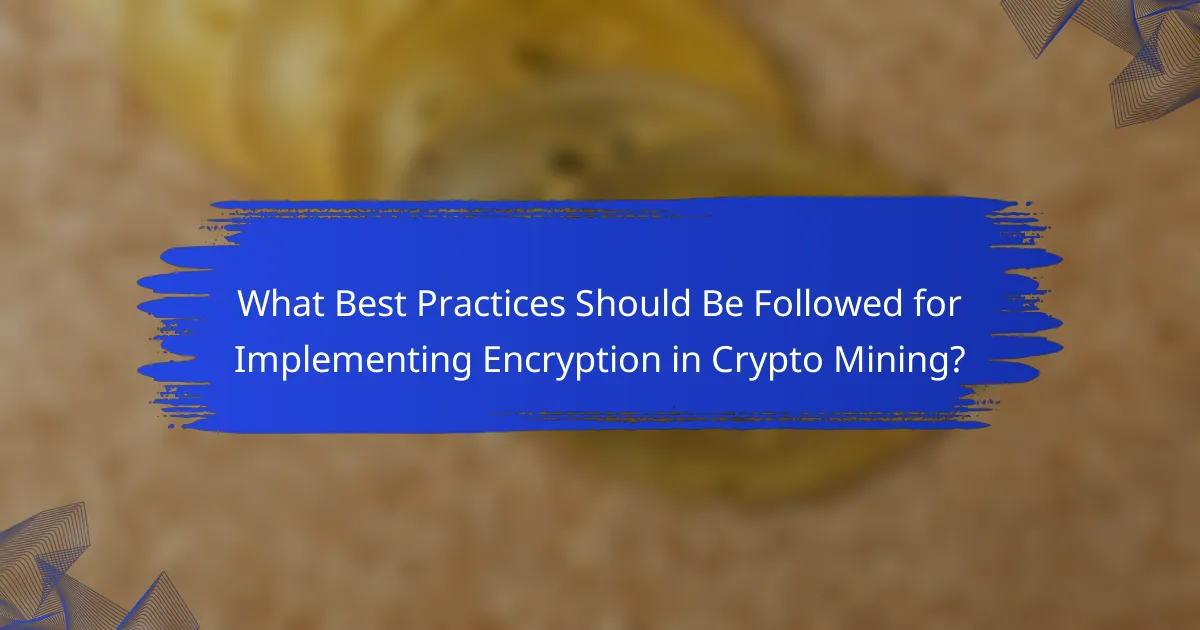Encryption is a critical process in crypto mining that converts data into a coded format, safeguarding sensitive information such as wallet addresses and transaction details from unauthorized access. It enhances security, ensures data integrity, and maintains privacy, thereby reducing the risk of cyber threats and fraud. Common encryption protocols, including AES and RSA, play a vital role in protecting data transmitted over networks. Best practices for implementing encryption in crypto mining include using strong algorithms, regularly updating encryption keys, employing multi-factor authentication, and conducting security audits to identify vulnerabilities. These measures collectively strengthen the security framework of crypto mining operations.

What is Encryption and How Does it Relate to Network Security in Crypto Mining?
Encryption is the process of converting data into a coded format to prevent unauthorized access. In crypto mining, encryption secures sensitive information, such as wallet addresses and transaction details. It ensures that only authorized users can access or modify this data. Encryption protocols, like AES and RSA, are commonly used in network security. These protocols protect the integrity and confidentiality of data transmitted over the network. By using encryption, miners can safeguard their operations against potential attacks. This reduces the risk of data breaches and enhances overall network security. Studies show that strong encryption significantly decreases the likelihood of cyber threats in digital currencies.
How does encryption enhance the security of crypto mining networks?
Encryption enhances the security of crypto mining networks by protecting sensitive data and communications. It ensures that transaction data and miner information are kept confidential. This confidentiality prevents unauthorized access and data breaches. Encryption also authenticates the identity of users and devices in the network. This authentication reduces the risk of impersonation attacks. Furthermore, encryption secures the communication channels between miners and the blockchain. It protects against eavesdropping and man-in-the-middle attacks. By using strong encryption protocols, crypto mining networks can maintain integrity and trust among participants. These measures collectively strengthen the overall security posture of the network.
What are the different types of encryption used in crypto mining?
The different types of encryption used in crypto mining include symmetric encryption, asymmetric encryption, and hashing algorithms. Symmetric encryption uses the same key for both encryption and decryption. This type is fast and efficient but requires secure key management. Asymmetric encryption employs a pair of keys: a public key for encryption and a private key for decryption. This method enhances security but is slower than symmetric encryption. Hashing algorithms, such as SHA-256, are crucial in crypto mining. They convert data into fixed-size strings, ensuring data integrity and security. Hashing is a one-way function, making it impossible to retrieve the original data. These encryption types collectively secure the mining process and protect transactions on the blockchain.
How does encryption protect sensitive data in crypto mining operations?
Encryption protects sensitive data in crypto mining operations by converting it into a format that is unreadable without a decryption key. This process ensures that even if data is intercepted, it remains secure and confidential. Encryption algorithms, such as AES (Advanced Encryption Standard), are widely used for this purpose. They provide a high level of security, making unauthorized access extremely difficult. Additionally, hashing techniques are employed to secure transaction data, ensuring its integrity. These methods help prevent data breaches and unauthorized modifications. By implementing encryption, crypto mining operations can safeguard sensitive information from cyber threats.
Why is network security critical in the context of crypto mining?
Network security is critical in the context of crypto mining because it protects sensitive data and assets from cyber threats. Crypto mining involves significant financial transactions and valuable digital assets. A breach can lead to loss of funds or unauthorized access to mining operations. Cyber attacks, such as Distributed Denial of Service (DDoS) attacks, can disrupt mining activities. According to a report by Cybersecurity Ventures, cyber crime is projected to cost businesses over $10 trillion annually by 2025. Therefore, strong network security measures are essential to safeguard against these risks. Effective encryption methods can enhance security by protecting communication and transaction data.
What threats do crypto mining networks face without encryption?
Crypto mining networks without encryption face significant security threats. These threats include data breaches, where sensitive information can be accessed by unauthorized users. Without encryption, transaction data can be intercepted during transmission. This interception can lead to double-spending attacks, undermining the integrity of the cryptocurrency. Additionally, miners risk exposure to Distributed Denial of Service (DDoS) attacks, which can disrupt operations. The lack of encryption also makes networks vulnerable to man-in-the-middle attacks, where attackers can alter communications. Overall, encryption is crucial for safeguarding against these threats and ensuring secure mining operations.
How can network vulnerabilities impact crypto mining profitability?
Network vulnerabilities can significantly reduce crypto mining profitability. These vulnerabilities can lead to attacks such as double-spending or denial-of-service, which disrupt mining operations. When miners face such disruptions, their ability to validate transactions and earn rewards diminishes.
For example, a 2020 report by the Blockchain Security Alliance highlighted that 51% attacks can compromise a network’s integrity, leading to financial losses for miners. Additionally, if miners’ hardware is targeted, they may incur repair or replacement costs.
In summary, network vulnerabilities directly threaten the operational efficiency and financial returns of crypto mining activities.

What are the Key Benefits of Using Encryption in Crypto Mining?
The key benefits of using encryption in crypto mining include enhanced security, data integrity, and privacy. Encryption protects sensitive data from unauthorized access. It ensures that transaction details remain confidential. This confidentiality is crucial in preventing fraud and hacking attempts. Moreover, encryption helps maintain data integrity by verifying that information has not been altered. This verification process is essential for building trust in the network. Additionally, encryption allows miners to securely communicate without exposing their identities. This anonymity helps protect miners from potential threats. Overall, encryption significantly strengthens the security framework within crypto mining operations.
How does encryption improve the integrity of transactions in crypto mining?
Encryption enhances the integrity of transactions in crypto mining by ensuring data authenticity and preventing tampering. It secures transaction details through cryptographic algorithms. These algorithms create unique digital signatures for each transaction. This signature verifies that the transaction has not been altered. When miners validate transactions, they check these signatures against the original data. Any discrepancies indicate potential fraud or manipulation. Additionally, encryption protects sensitive information from unauthorized access. This further strengthens the overall security of the blockchain network. As a result, the integrity of transactions is maintained throughout the mining process.
What role does encryption play in preventing fraud in crypto mining?
Encryption plays a critical role in preventing fraud in crypto mining. It secures transactions and data exchanges within the network. By encrypting sensitive information, it becomes unreadable to unauthorized users. This protects against data breaches and manipulation attempts. Additionally, encryption ensures the integrity of the blockchain. It verifies that the data has not been altered during transmission. Cryptographic algorithms like SHA-256 are commonly used in mining processes. These algorithms create unique hashes for each block, making it difficult to alter past transactions. Overall, encryption enhances trust and security in the crypto mining ecosystem.
How does encryption contribute to user trust in crypto mining platforms?
Encryption enhances user trust in crypto mining platforms by securing sensitive data. It protects users’ personal information and financial transactions from unauthorized access. This security measure ensures that data remains confidential and integral during transmission. Users are more likely to engage with platforms that prioritize their privacy. According to a survey by Deloitte, 76% of consumers are concerned about data privacy. Platforms employing robust encryption methods demonstrate a commitment to safeguarding user information. This transparency fosters a trustworthy relationship between users and the platform. Enhanced security through encryption ultimately leads to increased user confidence in the mining process.
What are the implications of encryption on mining efficiency?
Encryption can negatively impact mining efficiency. It requires additional computational resources to encrypt and decrypt data. This increased demand can slow down the mining process. As a result, miners may experience reduced hash rates. Lower hash rates lead to longer times for solving blocks. Consequently, this can affect overall profitability. Furthermore, the complexity of encryption algorithms adds to the processing time. Research indicates that encryption can decrease transaction throughput in blockchain networks.
How can encryption impact the speed of crypto mining operations?
Encryption can slow down crypto mining operations. This occurs because encryption requires additional computational resources. Miners must encrypt and decrypt data, which consumes processing power. The added workload can lead to reduced mining efficiency. For example, in a study by the University of Cambridge, it was found that encryption can increase processing time by up to 20%. Therefore, while encryption enhances security, it can negatively affect mining speed.
What balance must be struck between encryption strength and mining performance?
A balance must be struck between encryption strength and mining performance to ensure both security and efficiency. Strong encryption increases security by making it difficult for unauthorized parties to access sensitive data. However, excessive encryption can slow down mining operations, reducing overall performance. Efficient mining requires quick processing times, which can be hindered by complex encryption algorithms.
For example, using lightweight encryption can enhance speed but may expose the network to risks. Conversely, using robust encryption can protect against attacks but may lead to increased computational costs. Finding an optimal point involves evaluating the specific requirements of the mining operation and the level of security needed.
Studies indicate that a moderate level of encryption can provide adequate security without significantly impacting mining performance. Therefore, the ideal balance is one that aligns security needs with operational efficiency.

What Best Practices Should Be Followed for Implementing Encryption in Crypto Mining?
Implementing encryption in crypto mining requires several best practices to ensure security. First, use strong encryption algorithms such as AES-256. This algorithm is widely recognized for its robust security features. Second, regularly update encryption keys to prevent unauthorized access. Key rotation should occur at defined intervals. Third, implement multi-factor authentication for access to mining operations. This adds an additional layer of security. Fourth, utilize secure communication protocols like TLS for data transmission. TLS protects data from interception during communication. Fifth, ensure that all mining software is regularly updated to patch vulnerabilities. Keeping software current reduces the risk of exploitation. Finally, conduct regular security audits to identify and mitigate potential weaknesses in the encryption implementation. These practices collectively enhance the security of crypto mining operations.
What steps can be taken to ensure effective encryption in crypto mining?
To ensure effective encryption in crypto mining, implement strong cryptographic algorithms. Use AES (Advanced Encryption Standard) with a key size of at least 256 bits. Regularly update encryption keys to prevent unauthorized access. Employ secure key management practices to protect private keys. Utilize SSL/TLS protocols for secure communication between nodes. Conduct regular security audits to identify vulnerabilities in the encryption process. Monitor for unusual activity that may indicate a breach. These steps enhance the overall security of crypto mining operations.
How can miners assess the effectiveness of their encryption methods?
Miners can assess the effectiveness of their encryption methods by conducting performance evaluations and [censured] testing. Performance evaluations measure the speed and resource consumption of encryption algorithms during mining operations. Miners can analyze the time taken for data encryption and decryption processes. [censured] testing involves simulating attacks on the encryption to identify vulnerabilities. This testing helps determine if the encryption can withstand unauthorized access attempts. Additionally, miners can review industry benchmarks and standards for encryption strength. Comparing their methods against these benchmarks provides a clearer picture of effectiveness. Regular updates and audits of encryption protocols also enhance security assessments. These practices ensure that miners maintain robust encryption methods in a constantly evolving threat landscape.
What common mistakes should be avoided when implementing encryption?
Common mistakes to avoid when implementing encryption include using weak algorithms. Weak algorithms can be easily compromised, leading to data breaches. Another mistake is failing to update encryption protocols regularly. Outdated protocols may have vulnerabilities that attackers can exploit.
Additionally, neglecting key management is critical. Poor key management can result in unauthorized access to encrypted data. Misconfiguring encryption settings is also a frequent error. Incorrect settings can weaken the overall encryption strength.
Lastly, assuming encryption alone guarantees security is misleading. Encryption should be part of a broader security strategy that includes other protective measures. These mistakes can severely undermine the effectiveness of encryption in securing networks, especially in crypto mining.
How can miners stay updated on encryption technologies and threats?
Miners can stay updated on encryption technologies and threats by subscribing to industry news sources. Websites like CoinDesk and CryptoSlate provide timely updates. Participating in forums such as BitcoinTalk enables discussion on recent developments. Attending conferences and webinars offers insights from experts. Following cybersecurity organizations on social media keeps miners informed about emerging threats. Engaging with academic journals can provide in-depth analysis of encryption advancements. Regularly reviewing white papers from blockchain projects helps miners understand new technologies. These actions ensure miners remain knowledgeable about encryption trends and threats.
What resources are available for learning about encryption in crypto mining?
Resources for learning about encryption in crypto mining include online courses, academic papers, and specialized books. Websites like Coursera and Udemy offer courses on blockchain technology and encryption techniques. Academic papers can be found on platforms such as Google Scholar, detailing encryption methods used in crypto mining. Books like “Mastering Bitcoin” by Andreas Antonopoulos provide insights into cryptographic principles. Additionally, forums and communities like Stack Exchange discuss practical applications of encryption in mining. These resources collectively cover fundamental and advanced topics in encryption relevant to crypto mining.
How can miners collaborate to enhance encryption practices in the industry?
Miners can collaborate to enhance encryption practices by sharing best practices and developing standardized protocols. This collaboration can lead to a unified approach in implementing encryption across mining operations. Regular workshops and forums can facilitate knowledge exchange among miners. By pooling resources, miners can invest in advanced encryption technologies. Joint research initiatives can also be established to explore innovative encryption methods. Data sharing agreements can enhance collective security measures. Collaborative efforts can lead to the creation of a secure mining ecosystem. Enhanced encryption practices can significantly mitigate risks associated with data breaches.
Encryption is a critical entity in the realm of crypto mining, serving to secure sensitive data and enhance network security. This article explores the various encryption methods, including symmetric and asymmetric encryption, and their role in protecting transaction integrity and user confidentiality. It also addresses the implications of encryption on mining efficiency, profitability, and the importance of implementing best practices for effective encryption. Furthermore, the article highlights the collaborative efforts among miners to establish robust encryption standards, ultimately aiming to mitigate risks associated with cyber threats in crypto mining operations.